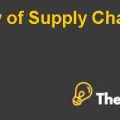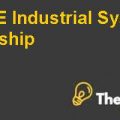
Supplier Model
The current supplier model followed at Ford Motors is quite complex and difficult to understand. The company in the recent past has decreased the number of suppliers database where it has considered to come closer to the suppliers by maintain long term relationships with the “Tier 1 suppliers”. The Tier 1 suppliers are the ones who provide Ford Motors with a complete vehicle subsystem. Along with this, Tier 1 suppliers work with multiple Tier 2 suppliers who can actually provide the components to make up the vehicle subsystem for the company.
Along with this, Tier 1 suppliers do not really have the capital investment in the latest technologies which Ford has seemed to get into. The Tier 1 suppliers do not have strong command and control over Information Technology capabilities. However, it drops quite drastically when the Tier 1 deals with the Tier 2 suppliers for Ford. Along with this, Tier 1 and Tier 2 suppliers do not coordinate and communicate with each other in an effective manner which increases the lead time of orders and higher cost and the operational hassle. Therefore, it can be said that the two systems of suppliers at Ford Motors has been effecting the company in a negative manner.
Control over users
Ford Motors does not have control over the end users. The reason is rather simple, Ford Motors offers independent dealership network to sell the products to the end user which hampers the control of the company over the end users or the consumers. Therefore, this aspect of company has affected Ford in a negative manner because the company does not have the ability and the control over the decision making and the customer service.
Forecasting Customer Demand
Ford Motors does not involve dealers in forecasting customer demand. Unlike Dell which has always looked to involve the dealers in forecasting customer demand. This attribute of the company has actually made the organization predict the demand of customers. However, since Ford Motors does not look to involve the dealers in forecasting therefore, they are unable to predict the exact demand of customers in the future for automobiles.
Along with this, Tier 1 suppliers do not really have the capital investment in the latest technologies which Ford has seemed to get into. The Tier 1 suppliers do not have strong command and control over Information Technology capabilities. However, it drops quite drastically when the Tier 1 deals with the Tier 2 suppliers for Ford. Along with this, Tier 1 and Tier 2 suppliers do not coordinate and communicate with each other in an effective manner which increases the lead time of orders and higher cost and the operational hassle. Therefore, it can be said that the two systems of suppliers at Ford Motors has been effecting the company in a negative manner.
Analysis of the Alternative Solutions
Web Based Supply Chain Model
In order to overcome the issue of lack of coordination among Tier 1 and Tier suppliers, Ford Motors need to invest on the web based supply chain model. The reason, Ford should look to invest in web based supply chain model is because it will basically allow the Tier 1 suppliers to actually use the technology in developing direct links with the Tier 2 suppliers. Along with this, Ford Motors by investing on web based supply chain model, will allow the company and the Tier 1 suppliers to hold the IT capabilities without actually investing large investment on capital emerging technology which will allow Tier 2 suppliers to access the system.
Along with this, with the installation of web based supply chain model the suppliers will have a central design which will be controlled and accessed by Ford Motors itself. Furthermore, the prices will also be hidden for each material purchase. With the introduction of WBSCM, Ford Motors will have more authority and control in the establishment of technological functioning. This will help Ford to limit the accessibility of the suppliers. The security system for the supplier demand and control will also come to Ford Motors itself.
Outsource Forecasting
As for now, Ford Motors does not involve the dealers in forecasting the demand of customer orders. The company does not involve the dealers in the prediction of sales and order which has been affecting the company in a negative way. Therefore, to overcome this issue Ford Motors should consider outsourcing the forecasting of orders to a third party company....................................
This is just a sample partial case solution. Please place the order on the website to order your own originally done case solution.













